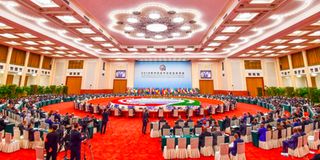In Africa, it is the power of China’s example that counts

A gathering of African Heads of State and Government at a High Level meeting during the Forum on China-Africa Cooperation (FOCAC) 2018 Summit in Beijing, China.
The year 2021 is coming to a close with notable high on Sino-Africa cooperation.
During the 8th Ministerial Conference of Forum on China Africa Cooperation (Focac) held in Senegal on November 29-30, Chinese leader President Xi Jinping announced one billion Covid-19 vaccine doses support to the continent towards helping Africa achieve the 60 per cent vaccination target in 2022.
The Focac conference also arrived at multiple cooperative arrangements that will shape China-Africa ties for the next three years.
These include support for regional connectivity projects; greater private sector involvement, stronger youth and women voices; united action against poverty; guided synergy on climate change and promotion of more African exports into China.
Beijing is today Africa’s largest trading partner for 12 years in a row. China is a lead development projects financier as well as constructor in the continent. Chinese FDI stock in Africa has been on an upswing from just 75 million US dollars in 2003 to hit 110 billion US dollars in 2019.
Under the Belt and Road Initiative that now has 46 African countries onboard, China is undertaking massive infrastructure upgrades across the continent – enhancing national economic competitiveness and contributing over 20 per cent to Africa’s economic growth in the last decade.
Consensus building
Focac, which was founded in the year 2000, has provided a sustainable platform for dialogue, policy coordination and consensus building between China and African countries.
The rising goodwill has expanded people to people ties between China and Africa with Beijing emerging as the most preferred destination for African students seeking higher education abroad.
These developments have certainly caused anxiety among world’s major powers which have interpreted the thriving Sino-Africa ties as a zero-sum game in which Africa’s traditional partners are losing influence on the continent to Beijing.
News initiatives like the Build Back Better World (B3W) that was proposed by the US and endorsed by the G7 countries; and the European Union’s Global Gateway have all been conceived as alternatives to China’s BRI in developing countries.
The view from both Washington and Brussels is to undercut China’s emboldening footprints in the developing world including in Africa which is home to the largest number of developing countries.
Africa’s traditional partners continue to misread the pillars of Sino-Africa ties. For a long time, western countries only saw the continent as a place to extract raw materials while using the space as a national security buffer zone. African economies fell behind; poverty remained entrenched as infrastructure remained dilapidated or nonexistent.
African countries’ voices were muscled at the multilateral platforms, only being viewed as charity cases.
Socio economic transformation
China has completely turned that script upside down. As a major developing country, Beijing’s socio-economic transformation – lifting over 750 million people out of poverty in just three decades appealed to many countries in Africa.
China proved that development must not be predicated on foreign ideologies. Secondly, China engages African countries as equals – avoiding the pitfall of interference in domestic affairs of partner countries. Thirdly, China was willing to use proceeds of its development, chiefly, technology, and finances to support Africa’s development aspirations.
China saw Africa as a business case; elevated the role of trade and investments in rebooting African economies towards poverty reduction and livelihood transformation. On global partnerships, African countries are calling for more trade and less aid.
Finally, China’s foreign policy in which peace and development are the main anchors of international relations has been viewed by African leaders as the most sustainable way to integrate into the world economy, get dignity for their people while retaining their sovereignty.
Unique strengths
Due to the enviable outcomes of cooperation between China and Africa, new interest is coming from western countries.
The US is redrawing its engagement matrix with Africa while much of Europe is doubling down on its visibility activities in the continent. This is certainly good for
Africa. The continent needs more partners. With every partner proposing new avenues of cooperation that leverages unique strengths and shared interests, Africa’s development outcomes will be amplified.
Instead of constant competition and even outright rivalry, there are many areas of cooperation that exist among Africa’s development partners. President Xi Jinping has proposed synergy with European partners in Africa.
Similarly, African leaders have no desire to be pushed into an ‘either or corner,’ when it comes to working development partners. The power of China’s example has triggered a hunger for expedited development in the African continent. All parties are welcome to the realisation of a peaceful, economically prosperous continent with real contributions to the rest of the world.
The writer is a scholar of international relations with a focus on China-Africa cooperation. Twitter: @Cavinceworld





